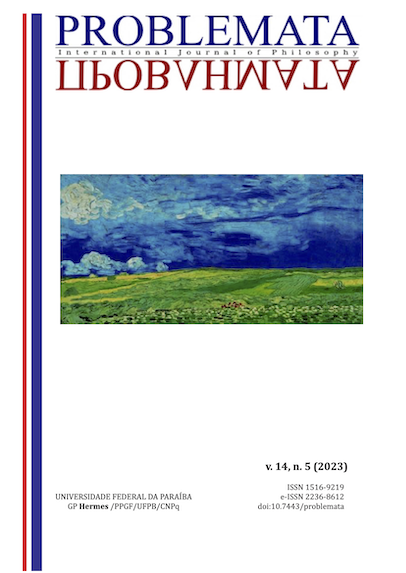IDEOLOGICAL MASSIFICATION AND SUPERFICIALITY OF REASON:
THOUGHT AS A PROPHYLAXIS OF BANAL EVIL IN ARENDT
DOI:
https://doi.org/10.7443/problemata.v14i5.67422Keywords:
Thought, Tradition, Common sense, Massification, Ideology, Banal evil, MeaningAbstract
This article investigates the causes and points to possible solutions and/or preventions against banal evil. The causes are directly linked to the massification of society which, due to the break with the tradition of Western thought, ends up moving away from common sense, which is what guarantees the notion of shared reality. Thus, space is opened for the rise of totalitarian ideologies that completely reframe reality, making those who sink into them end up living in a completely illusory parallel world. To understand what banal evil is, Arendt's analysis of the figure of Eichmann was taken as a parameter, who, detached from reality, abdicates his duty to think, and delegates the meaning of his world to his superiors, becoming one of the greatest evildoers of humanity. Therefore, for Arendt, massification is what prepares the ground for the manifestation of banal evil, while its prevention goes precisely through the opposite path, that is, the use of the faculty of thinking, which requires imagination and memory, to enter the world of meanings and make the individual autonomous and aware of his role in giving meaning to the reality that surrounds him.
Downloads
References
AGOSTINHO. Confissões. Tradução: J. Oliveira Santos, A. Ambrósio de Pina. 8. ed. Porto: Livraria apostolado da imprensa, 1975.
ALVES, Marcos Alexandre; ZANELLA, Diego Carlos; ZANARDI, Isis Moraes. A formação humana e a incapacidade de pensar: considerações sobre o problema do mal em Hannah Arendt. Aufklärung, v. 4, n. 2, p. 67-78, mai./ago. 2017. DOI http://dx.doi.org/http://10.18012/arf.2016.33701.
ARENDT, Hannah. A condição humana. Tradução Roberto Raposo. 13. ed. rev. Rio de Janeiro: Forense Universitária, 2020.
ARENDT, Hannah. A vida do espírito: o pensar, o querer, o julgar. Tradução Antônio Abranches, Cesar Augusto R. de Almeida, Helena Martins. Rio de Janeiro: Relume Dumará: Ed. UFRJ, 1992. v. 2.
ARENDT, Hannah. Eichmann em Jerusalém: um relato sobre a banalidade do mal. Tradução: José Rubens Siqueira. São Paulo: Companhia das letras, 1999.
ARENDT, Hannah. Entre o passado e o futuro. Tradução Mauro W. Barbosa de Almeida. 2. ed. São Paulo: Editora perspectiva, 1988.
ARENDT, Hannah. Homens em tempos sombrios. Tradução Denise Bottmann. São Paulo: Editora Schwarcz Ltda., 1987.
ARENDT, Hannah. Origens do totalitarismo: antissemitismo, imperialismo, totalitarismo. Tradução Roberto Raposo. 1. ed. São Paulo: Companhia das letras, 2012.
ARENDT, Hannah. The origins of totalitarism. New York: The World Publishing Company, 1962. Disponível em: https://cheirif.files.wordpress.com/2014/08/hannah-arendt-the-origins-of-totalitarianism-meridian-1962.pdf.
ARISTÓTELES. A política. Tradução Nestor Silveira Chaves. São Paulo: Ícone Editora Ltda., 2007.
BÍBLIA. Português. Bíblia de Jerusalém. São Paulo, SP: Paulus, 2002.
CÍCERO, Marco Túlio. Da República. Tradução: Amador Cisneiros. 3. ed. São Paulo: Atena Editora, 1964.
CARR, Nicholas. The Shallows: what the Internet is doing to our brains. Nova York: W. W. Norton & Company Ltd., 2020.
DOSTOIÉVSKI, Fiódor Mikháilovitch. Crime e castigo. Tradução: Natália Nunes. São Paulo: Abril Cultural, 1979.
FRY, Karin A. Compreender Hannah Arendt. Tradução Paulo Ferreira Valério. Petrópolis, RJ: Vozes, 2010.
HARMAN, Chris. O que é o marxismo?. Tradução: José André López Gonçález. 1979. Disponível em: https://www.marxists.org/portugues/harman/1979/marxismo/index.htm
HITLER, Adolf. Minha luta. Tradução Klaus Von Punschen. São Paulo: Centauro, 2001.
HOMERO. Odisséia. Tradução: Antônio Pinto de Carvalho. São Paulo: Abril Cultural, 1979.
KANT, Immanuel. Crítica da razão pura. Tradução: Manuela Pinto dos Santos. Lisboa: Fundação Calouste Gulbenkian, 1985.
KANT, Imannuel. Fundamentação da metafísica dos costumes. Tradução: António Pinto de Carvalho. São Paulo: Companhia Editora Nacional, 1964.
LAFER, Celso. Da dignidade da política: Sobre Hannah Arent. In: ARENDT, Hannah. Entre o passado e o futuro. 2. ed. São Paulo: Editora perspectiva, 1988. p. 9-27.
MARX, Karl; ENGELS, Friedrich. Manifesto do partido comunista. Tradução: Marco Aurélio Nogueira, Leandro Konder. 3. ed. Petrópolis: Vozes, 1990.
MARX, Karl. Teses sobre Feuerbach. 1988. Disponível em: http://www.dominiopublico.gov.br/download/texto/ma000081.pdf. Acesso em: 14 nov. 2022.
MILGRAM, Stanley. Behavioral Study of Obedience. Journal of Abnormal and Social Psychology, v. 67, p. 371–378, 1964. DOI https://doi.org/10.1037/h0040525
PINZANI, Alessandro. Os sonâmbulos do mal: Eichmann e o nazismo na ótica de Hannah Arendt. In: CESCON, Everaldo (org.); Leonardo Inácio Pereira (org.); Paulo César Nodari (org.). O mistério do mal: urgência da educação para o bem. Caxias do sul, RS: Educs, 2006. p. 59-78
PLATÃO. Diálogos I: Teeteto (ou Do conhecimento), Sofista (ou Do ser), Protágoras (ou Sofistas). Tradução: Edson Bini. 1. ed. São Paulo: Edipro, 2007.
RUBIRA, Luís. Uma introdução à transvaloração de todos os valores na obra de Nietzsche. Tempo da Ciência, [S. l.], v. 12, n. 24, p. p. 113–122, 2000. DOI: 10.48075/rtc.v12i24.449
SCHIO, Sônia Maria. A atualidade do mal através da perspectiva arendtiana. In: CESCON, Everaldo; Leonardo Inácio Pereira; Paulo César Nodari (org.). O mistério do mal: urgência da educação para o bem. Caxias do sul, RS: Educs, 2006. p. 137-154.
SCHIO, Sônia Maria. Hannah Arendt: história e liberdade: da ação à reflexão. 2. ed. Porto Alegre, RS: Clarinete, 2012.
SÓFOCLES. Antígona. Tradução: Donaldo Schüller. Porto Alegre: L&PM Editores, 1999.
Downloads
Published
Issue
Section
License
Copyright (c) 2024 Marcos Alexandre Alves, Vitor Kirchner Fiorin

This work is licensed under a Creative Commons Attribution 4.0 International License.
Authors who publish with this journal agree to the following terms:
- Authors retain copyright and grant the journal right of first publication with the work simultaneously licensed under a Creative Commons Attribution License that allows others to share the work with an acknowledgement of the work's authorship and initial publication in this journal.
- Authors are able to enter into separate, additional contractual arrangements for the non-exclusive distribution of the journal's published version of the work (e.g., post it to an institutional repository or publish it in a book), with an acknowledgement of its initial publication in this journal.
-
- Authors are permitted and encouraged to post their work online (e.g., in institutional repositories or on their website) prior to and during the submission process, as it can lead to productive exchanges, as well as earlier and greater citation of published work (See The Effect of Open Access).





